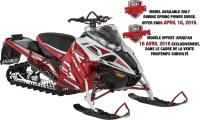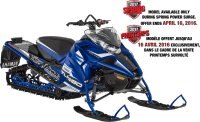|
Conquer Snow
|
|
Cast Steel Header |
|
|
Triple Throttle Bodies |
|
|
Yamaha - Mitsubishi ECU |
|
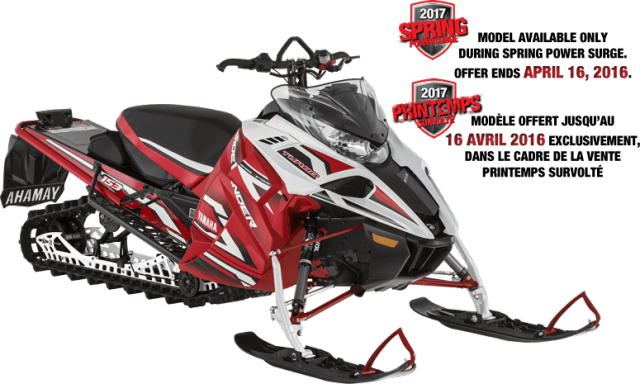
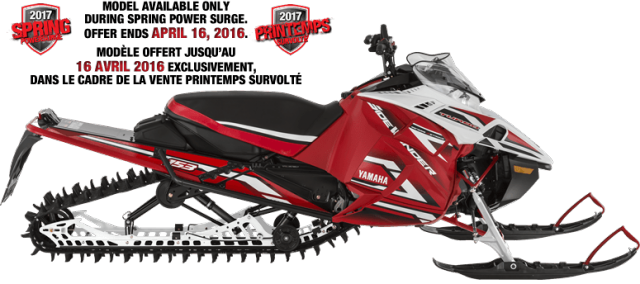
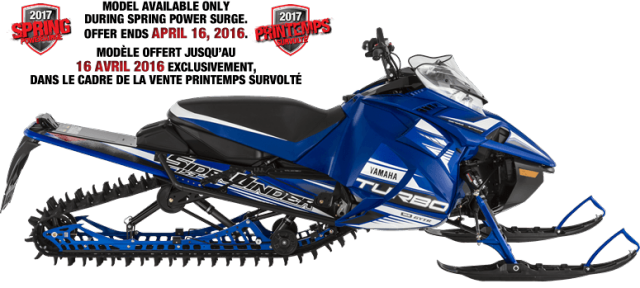
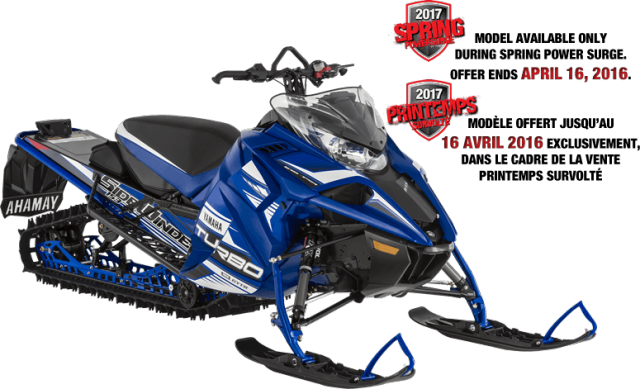
Yamaha Sidewinder B-TX LE 153
M.S.R.P: $19,699 CAD Our Price: $19,499 CAD ID: 13482394Videos
Item Information
|
Conquer Snow
|
|
Cast Steel Header |
|
|
Triple Throttle Bodies |
|
|
Yamaha - Mitsubishi ECU |
|
|
Performance |
The base of the Genesis 998T is the over-achieving Genesis® triple. Already renowned for pulling consistently hard from takeoff to top end, the factory-installed Turbo takes it to next level status while maintaining Yamaha's reputation for quality, durability and reliability.
The Nickel alloy turbine body is extremely strong and precise, able to withstand highly elevated temperatures. Supported by top grade, ceramic ball bearings, the Inconel turbine blade assembly is very light and strong
The Yamaha Mitsubishi Electronic Control Unit (ECU) uses a series of 9 sensors to gather running condition data and computes using its predetermined memory 'map'. It then adjusts ignition timing, fuel delivery, manifold air-pressure and turbo boost pressure to produce maximum performance - reliably.
Each cylinder has its own throttle body located as close as possible to the intake valves. This unique design offers immediate throttle response when combined with the efficient turbo and air bypass system.
Unlike regular blow-off valves, the ABV redirects air pressure back into the intake side of the compressor to prevent surge and maintain impeller speed, always at the ready for the next acceleration.
Engine coolant is circulated through the turbocharger to control temperature. Upon engine shut down, the convection energy produced by super-heated coolant at the turbo keeps it circulating without the coolant pump in operation. This eliminates the need for an engine cool down cycle while maintaining high durability in the turbo components.
The effect of 4-stroke 'engine braking' when the throttle valves are closed has a significant impact on handling and ride character. Yamaha developed a special system which employs the ISC (idle speed control) circuit and ECU map using throttle valve movement and RPM information to reduce negative intake pressure during deceleration.
The lightweight aluminum block has ceramic composite plating applied directly to the cylinder wall to eliminate the need for a steel cylinder sleeve and in doing so ensures excellent abrasion resistance and cooling performance
A specialized press method manufacturing process is adopted (forging process without twisting of the metal) to provide the needed strength to the crankshaft assembly to withstand the additional stress produced within a 'boosted' engine.
Special, light weight, hardened steel connecting rod design has the optimum strength required to produce maximum power. New 'carburized' steel connecting rod uses nutted studs to join the close tolerance, machined faced, big-end. Special 'Defric' coating applied for cold start protection and to maximize reliability.
The forged aluminum pistons are formed without melting the original aluminum stock, so they retain the strength of the original solidification structure, which enables the design of a lighter piston. This lightweight piston contributes to better 'pick-up' or 'response' while also reducing vibration.
The new engine features a unique piston oil cooling system. Oil is sprayed directly at the underside of the pistons through special jets to help cool and lubricate them.
The Yamaha cam shaft is forged from a solid bar then machined to its final finish and a special heat treatment is applied. This produces a very lightweight and durable component capable of maintaining high RPMs.
The advantage of the reduction in vibration is realized in multiple benefits for both the vehicle and the operator adding greater running stability with less rider fatigue.
The new reverse cam secondary features roller cam followers to reduce friction and special hi efficiency casting designs to improve aerodynamic power loss and reduce temperature. Sheave casting strength is improved to handle the higher horsepower and drive ratio is increased for wider speed range allowing the use of lower final gears.
New 'YSRC' primary clutch is designed for high horsepower with greater Strength improved efficiency and enhanced cooling ability.
Yamaha's advanced fuel injection system controls fuel flow to the engine for spot-on performance and throttle response.
The Sidewinder chain case and cover serve as both a mounting point for chassis spars and the engine's oil reservoir. Lightweight magnesium construction minimizes weight.
The Sidewinder's high performance Hayes brake system delivers stopping power with a large-diameter, 8-inch rotor. Mounted low on the drive shaft, you feel immediate whoa-power with a quick stab of the brake. The hydraulic brake's race-inspired radial master cylinder design gives you excellent leverage when needed, with precise brake feel and control. and mountainous
The 153x2.25x15 inch Power Claw track grabs plenty of traction with its aggressive deep lug pattern. The PowerClaw was designed as a mountain specific track. This version is excellent for slaying eastern off-trail playgrounds and mountainous high country alike with the perfect length to balance its flotation with agile manoeuvrability. |
|
Handling |
The SRV M chassis combines a load-bearing triangulated structure with lightweight aluminum construction to create a neutrally balanced sled that's centered on the rider. The pyramidal upper frame creates chassis strength without excessive weight.
The 40 inch mid-stance adjustable front suspension features unique mountain spindles with geometry designed for predictable deep snow manoeuvers. Less drag when side hilling and carving helps hold the line for more precise handling. The a-arms are mounted at a 30-degree angle from the sled's centerline to efficiently dissipate impact force throughout the entire chassis. Likewise, the front shocks mount directly to the leading spar so that trail forces are routed to the strongest part of the chassis. Wide a-arm spacing minimizes flex and stress in the front suspension system, which means consistent and confident corner handling.
This lightweight, uncoupled, twin air shock system is calibrated for excellent transfer and deep snow floatation. It features a front Float3 and rear Float3 EVOL-R shock.
The SRV-M chassis layout was engineered with the goal of centralizing mass. Approximately 60 percent of the sled's weight is tightly centered within the main triangulation. The result is a quick-handling sled that's fun in a wide variety of conditions.
Maximized deep snow maneuverability, it features a special design for maximum floatation, low steering effort on and off trail and predictable side hilling as the ski holds its line.
The ski rubbers on the Sidewinder are asymmetrical, with a portion of the part serving as a spacer for the ski. This allows riders to adjust the ski stance on the Sidewinder by simply switching the ski rubbers from left to right, and right to left.
The straight steering post on the Sidewinder is configured over the engine. It connects to a single bell crank for simplicity and light weight. The design also minimizes freeplay in the steering system and delivers a tight turning radius.
To match the Sidewinder's tall and forward riding position, a single-piece, dual-hooked handlebar is standard fare. The hooks have the same new grip material and thickness as the main bar section, for consistent control, regardless of hand position on the grip. |
|
COMFORT |
Light weight and progressive, these air sprung shocks feature an extra volume, Evol air chamber for greater sensitivity and range of adjustability.
The Sidewinder's two-piece, tapered Mountain tunnel gives you strength for the long haul and a tapered "fit" for enhanced leg comfort and overall ride positioning.
The Sidewinder's generous 37-litre fuel tank serves more purposes than just carrying a day's worth of fuel. It also cradles the battery and is the platform for the quick-release trail seat.
Extremely light and functional, this tall narrow saddle assists with standing transitions and rider mobility The addition of a contoured heating element gives added comfort on a frosty morning.
Full-featured and easy to read, the digital gauge displays critical information in a glance including speed, fuel level, trip mileage, tach and more. We even included a clock so you can watch the time fly.
Convenient handlebar positioning makes getting in reverse easy with just the push of your thumb. A servo motor shifts the drivetrain into reverse simply and consistently.
Yamaha's electric starter system allows consumers to fire up their Sidewinder with the turn of a key. There is no pulling on a nylon cord to get this high-tech engine growling! Electric start is a standard feature on all of Yamaha's 4-stroke machines. |
